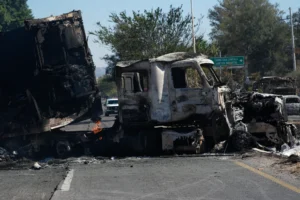Although the Nigerian Mission in Sudan and the National Emergency Management Agency had put plans in place to evacuate the citizens, Abike Dabiri-Erewa, the Chairman/Chief Executive Officer of the Nigerians in Diaspora Commission, said it was impossible for any flight during this time of war.
This was contained in a statement signed by Gabriel Odu of the Media, Public Relations and Protocols Unit, NIDCOM, on Friday.
The statement read, “The Chairman/CEO, Nigerians in Diaspora Commission, Abike Dabiri-Erewa, has said while the Nigerian Mission in Sudan and the National Emergency Management Agency have put in place arrangements to evacuate Nigerian students and other Nigerian citizens stranded in Sudan, the tensed situation makes it gravely risky and impossible for any flights at this point in time, noting that aircrafts parked at the airport in the country were burnt yesterday (Thursday) morning
“Dabiri-Erewa noted that humanitarian groups are seeking ways of getting food, water and medical supplies across to people.
“She therefore appealed to the fighting parties to consider the Juba Peace Agreement enunciated by the Intergovernmental Authority on Development as a fundamental mechanism for the restoration of peace and tranquillity in the country.”
Last Saturday, violence broke out between the Sudanese army and the paramilitary Rapid Support Forces in Khartoum’s capital city and its surrounding areas.
On Friday, the World Health Organisation reported that the ongoing conflict in Sudan had claimed at least 413 lives.
The WHO spokesperson, Margaret Harris, stated at a UN press conference that 413 people had died and 3,551 had been injured as a result of the conflict, citing statistics from the government of Sudan.
While this was going on, more than 1,700 Nigerian students pleaded with the federal government to evacuate them from the Republic of Sudan, where a fierce military clash between the Sudanese armed forces and the paramilitary group Rapid Support Force has resulted in over 400 deaths and 3,500 injuried.
The clashes had also displaced thousands of civilians who fled the capital, Khartoum, even as some foreign nations, including Japan, Uganda and Tanzania, had begun evacuating their nationals as the violence, which started on April 8, entered its 13th day on Friday.
General Abdel al-Burhan’s Sudanese Armed Forces and General Mohamed Dagalo’s RSF paramilitary organisation were allies up until recently.
According to information provided to PUNCH on Friday by Adam Mohammed, Secretary-General of the National Association of Nigerian Students in Sudan, 455 Nigerian students filled out the evacuation form between Thursday night and Friday.
1,717 Nigerian students had filled the evacuation form as of the time this report was filed.
When asked for updates on the Federal Government’s plan of evacuating the students, Mohammed said, “We have yet to hear from them.”
The secretary-general said about 12,000 Nigerian students were studying in Sudan, adding, “Most of them are currently in Nigeria for the Ramadan holidays because there is no academic activity during the holy month until after Eid.”
After appraising the situation in Sudan, the Federal Government on Thursday said it had requested permission to evacuate Nigerians, especially students, trapped in the conflict zone.

It also reiterated the call for a ceasefire to enable the evacuation of foreign citizens.
But an official who spoke on condition of anonymity, said, “Those countries evacuating their citizens have airlines, but we do not. Have they compiled their names with the mission to know how many of them are ready for evacuation? Nigeria is greater and bigger than those countries. How many people are they evacuating compared to us? It has to be properly planned.”



























